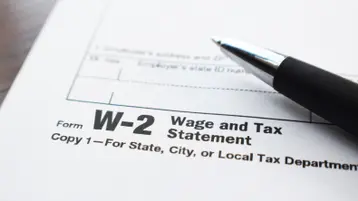Mastering Payroll Records: Tips for Efficiency and Compliance

Table of contents
- 1.Factors to Consider in Multistate Payroll
- 2.State unemployment insurance requirements
- 3.Workers' compensation requirements
- 4.Reciprocal state agreements
- 5.The convenience of the employer rule
- 6.Maintaining accurate records for each state
- 7.Best practices to consider with multistate payroll
Payroll management is a painstaking task and managing a multistate payroll can sometimes feel like solving a Rubik's cube. There are a number of situations that could force a business to deal with this problem, including:
- The business operates in multiple states
- The business sits near the border of two or more states and workers commute
- Remote employees live in one state but work virtually in another
- The business has employees working in more than one state
- Employees travel to temporary assignments in other states or take working vacations
Multistate payroll can be a challenge, especially when it involves state income tax. Rules on withholding income taxes can vary based on state and local requirements. Also, you may be required to withhold state income tax based on the employer's location, the employee's residence or both.
As the rise in remote workers grows, more companies will have to manage payroll processing with multistate compliance. This article will address the tricky waters a business with multistate payroll may need to consider navigating.
Factors to Consider in Multistate Payroll
When calculating multistate payroll tax, one of your biggest concerns is state and local withholdings. Federal withholding, Social Security and Medicare taxes don't change based on the state. However, state withholding requirements vary by state, so it is important to know the rules that apply to your payroll.
Local withholding taxes may be required too. Some states allow municipalities to calculate payroll tax within their borders differently. Here are some of the critical issues that can affect state taxes.
Withholding requirements can also vary from place to place, such as from an employer's home office to the employee's working location. Those doing payroll must understand the nuances in each state and locality to withhold tax properly.
State unemployment insurance requirements
Generally, the "worked-in" state provides unemployment insurance compensation and collects state unemployment tax, often referred to as “SUTA.” If an employer has employees working in multiple states, then the employer will have to pay SUTA to each state where they have employees working. For example, if the employee lives in a different state than the employer, such as a remote worker, the payment will generally go to the employee’s home state since that is where they are performing services.
If an employee works in multiple states throughout the year, it will depend on several factors. For instance, they may base it on where the employee spends most of their time or where they have their base of operations.
Workers' compensation requirements
All states set their own rules for workers' compensation benefits, so it is essential that you understand the laws that apply to your business. For example, the definition of a work-related incident can differ between states.
Reciprocal state agreements can also impact workers' compensation, but not all states have them.
Reciprocal state agreements
To make things more complicated, some states and the District of Columbia have a reciprocal agreement so that employees working in one state and living in another avoid double income tax withholding. Reciprocal agreements may exist between states that have close ties, such as Maryland and Virginia.
But not all such states that have reciprocity agreements. New York and New Jersey, for example, do not but an employee may be able to claim a tax credit.
The convenience of the employer rule
The convenience of the employer rule is something enforced by states to prevent tax evasion. Five states are using the convenience rule: Connecticut, Delaware, Nebraska, New York and Pennsylvania. Generally speaking, this rule means that wages paid to an employee from an employer based in one of these states is subject to income tax withholding for these states even if the employee performs services outside of these states unless an exception exists.
Pennsylvania, for example, can use this rule to tax an employee of a Philadelphia-based company who lives and works in New Jersey. That employee could be faced with two sets of state taxes – for both Pennsylvania and for New Jersey. The exception to this rule is if the employer requires the employee to live and work in another state due to a unique aspect of the work location required for the employee to perform their job duties or if the employer has setup a bona fide office for the employee.
Maintaining accurate records for each state
Companies with multistate payroll taxes must also ensure they retain the correct records for each state. States may not have the same requirements.
An easy way to do this is to research the payroll laws in each state and then create a comprehensive record retention list that covers all states. This way, you should have more than enough records if a state decides to do an audit of your payroll or taxes.
Best practices to consider with multistate payroll
Multistate payrolls are a challenge, but not an insurmountable one. The trick is to have a few common sense practices to keep the taxes accurate.
- Stay up to date on state payroll and payroll tax regulations and requirements. Also, keep a resource list for critical states so you can check for changes in the law.
- Develop a system for maintaining records. You want to ensure you have the proper documents should an agency audit occur or if you need them for some other reason.
- Audit your payroll process regularly to ensure compliance. Consider setting a schedule for doing the audit, such as quarterly.
- Keep the line of communication open with the employee. They may have questions or let you know if something changes in their work location.
TriNet payroll services experts give you support to help ensure compliance with regulations and requirements governing pay and payroll taxes in any state so your business can worry less about compliance. TriNet also offers a full-service human resources solution covering access to benefits, payroll processing, help with compliance HR issues and more.
This communication is for informational purposes only, is not legal, tax or accounting advice, and is not an offer to sell, buy or procure insurance.
This article may contain hyperlinks to websites operated by parties other than TriNet. Such hyperlinks are provided for reference only. TriNet does not control such web sites and is not responsible for their content. Inclusion of such hyperlinks on TriNet.com does not necessarily imply any endorsement of the material on such websites or association with their operators.

TriNet Team
Table of contents
- 1.Factors to Consider in Multistate Payroll
- 2.State unemployment insurance requirements
- 3.Workers' compensation requirements
- 4.Reciprocal state agreements
- 5.The convenience of the employer rule
- 6.Maintaining accurate records for each state
- 7.Best practices to consider with multistate payroll






